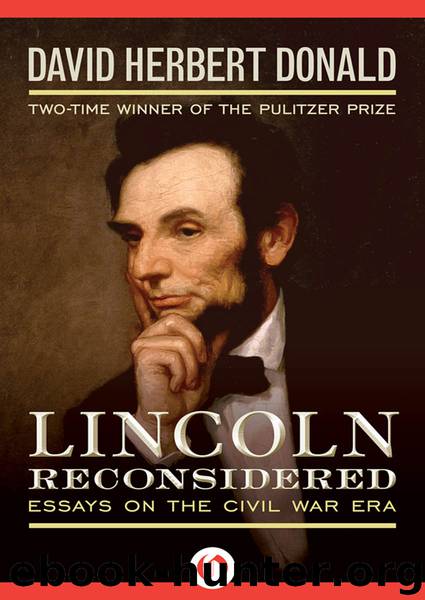Lincoln Reconsidered by David Herbert Donald

Author:David Herbert Donald
Language: eng
Format: mobi, epub
ISBN: 9781504034029
Publisher: Open Road Media
Published: 0101-01-01T00:00:00+00:00
II
Such, then, are the new villains of the piece. Civil War historians agree upon so few matters that one hesitates to start another controversy by questioning this universally held interpretation, but there seem to be valid reasons for challenging the stereotype of Lincoln-versus-the-Radicals.
After all, these “Jacobins” have received rather unfair treatment from the historians. The men, rather than their principles, come in for condemnation. Radicals are characterized as ugly, vain, pompous, power-grabbing, dictatorial, inflexible, oleaginous, arrogant, and unctuous—all at the same time! Because Thaddeus Stevens is said to have cherished a mulatto mistress and Salmon P. Chase presidential aspirations, because Ben Butler had a cocked eye and Charles Sumner a passion for Latin quotations, all right-thinking readers are supposed to condemn Radicalism. In all justice it should be pointed out that physical attributes do not make a statesman. Abraham Lincoln never won a beauty contest. Is it not possible for a Senator to be vain, ambitious, and even unctuous—and still be perfectly correct in his views? The historian who indulges in name-calling makes his point by innuendo rather than by argument.
But if one grants that these Radicals were antislavery zealots, unlovely in body and in spirit, it is hard to see that they have entirely merited the abuse heaped upon them. The charge that they were spokesmen for the business interests of the North presupposes a degree of unity among these antislavery leaders that did not, in fact, exist. Most of them favored a high tariff, it is true—but so did most Conservative Republicans and many Northern Democrats, too. Other economic issues found the Radicals badly divided. It was Charles Sumner who introduced the first bill for Federal regulation of railroads ever proposed in Congress, and he was supported by Radical Horace Greeley, but other Radicals killed his measure in committee. Some Radicals spoke for the creditor classes in financial affairs, abhorred inflation, and demanded a return to a specie basis of currency, but Radicals Ben Wade, Thad Stevens, and Ben Butler all championed greenback inflation. Most Radicals—and, indeed, most Congressman—stood for the sanctity of private property, yet Stevens and Sumner proposed to create economic democracy in the South by dividing plantations among the freedmen—a proposal that other Radicals condemned as “a piece of political vengeance wreaked without the intervention of courts of justice, in defiance of the forms of law and to the ruin of the innocent and helpless.”
If these Radical antislavery men were not united upon any positive social and economic program, they more nearly agreed about the things they opposed. But their dislike of slavery, of fumbling generalship, of presidential slowness, was shared by millions of Conservatives. It is true that Charles Sumner was bent on converting the war into an antislavery crusade, but so was his principal rival, the leader of the Massachusetts Conservative Republicans, Charles Francis Adams, who declared in 1861: “We cannot afford to go over this ground more than once. The slave question must be settled this time once for all.” Radicals were
Download
This site does not store any files on its server. We only index and link to content provided by other sites. Please contact the content providers to delete copyright contents if any and email us, we'll remove relevant links or contents immediately.
| American Revolution | Civil War |
| US Presidents |
Fanny Burney by Claire Harman(26602)
Empire of the Sikhs by Patwant Singh(23084)
Out of India by Michael Foss(16853)
Leonardo da Vinci by Walter Isaacson(13336)
Small Great Things by Jodi Picoult(7137)
The Six Wives Of Henry VIII (WOMEN IN HISTORY) by Fraser Antonia(5514)
The Wind in My Hair by Masih Alinejad(5095)
A Higher Loyalty: Truth, Lies, and Leadership by James Comey(4959)
The Crown by Robert Lacey(4814)
The Lonely City by Olivia Laing(4801)
Millionaire: The Philanderer, Gambler, and Duelist Who Invented Modern Finance by Janet Gleeson(4478)
The Iron Duke by The Iron Duke(4354)
Papillon (English) by Henri Charrière(4273)
Sticky Fingers by Joe Hagan(4197)
Joan of Arc by Mary Gordon(4109)
Alive: The Story of the Andes Survivors by Piers Paul Read(4031)
Stalin by Stephen Kotkin(3965)
Aleister Crowley: The Biography by Tobias Churton(3640)
Ants Among Elephants by Sujatha Gidla(3467)
